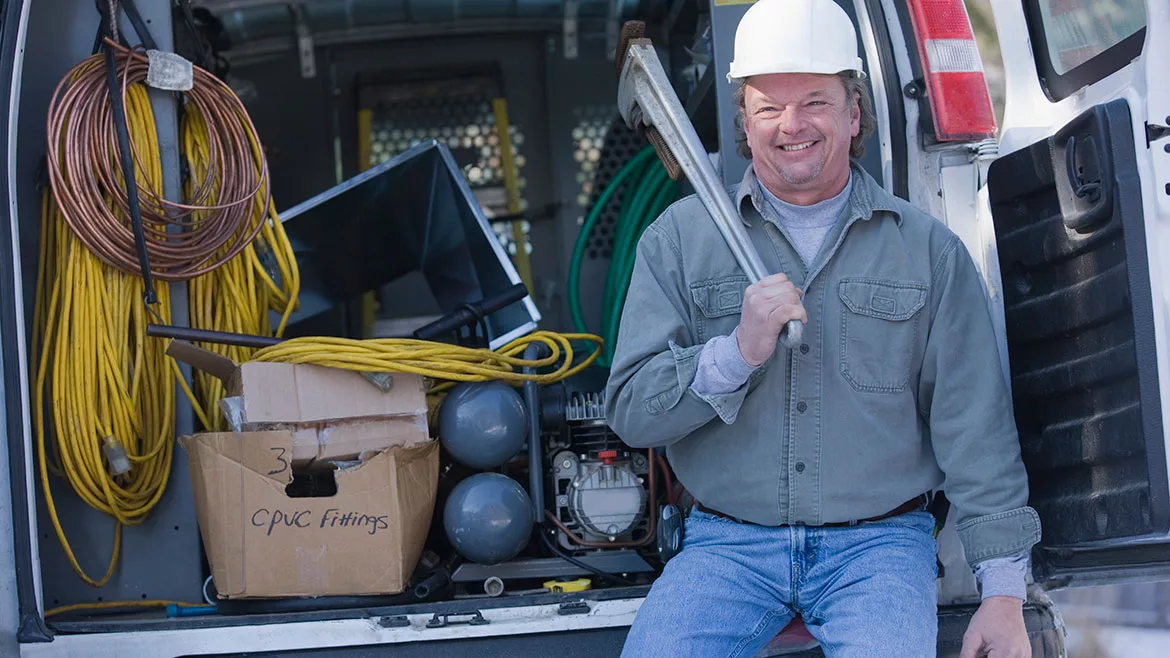Guest Editorial | Matt O’Rourke
The shift from independence to franchising: A Guide for Plumbers
How to make a successful leap to franchising.

Image Source: Huntstock / DisabilityImages / Getty Images Plus
The plumbing industry has long been a bastion of small, independent businesses, with many plumbers valuing their autonomy and personal touch. However, as the marketplace evolves, a growing number of these independent professionals are considering a transition into a franchise model. This shift can offer a host of benefits, including brand recognition, operational support, and a proven business model.
But while the prospect of franchising is enticing, it is essential for independent plumbers to navigate this transition thoughtfully. Here’s how to make the leap successfully.
Understanding the franchise landscape
The first step in considering a transition to a plumbing franchise is to fully grasp what it entails. Unlike the freedom of running an independent business, a franchise requires adherence to a set of standards and guidelines established by the franchisor. This can encompass everything from operational procedures and marketing strategies to customer service protocols.
For independent plumbers, this shift means relinquishing some control over how the business is run. However, it also offers significant advantages. Many franchisors provide extensive training and ongoing support, helping you adapt to your new business model while minimizing common pitfalls associated with starting a new venture.
Researching franchise opportunities
Once you’ve evaluated your current business, it’s time to explore available franchise opportunities. The plumbing industry boasts a variety of franchise models, each with its own unique selling propositions. Some may focus on residential plumbing services, while others cater to commercial clients.
To find the right fit, consider conducting thorough research. Seek out reviews and testimonials from current franchisees to gain insights into their experiences. Ask yourself: “Are they satisfied with the support they receive? Have they encountered challenges that you should be aware of?” Understanding the landscape of franchise opportunities will empower you to make an informed decision.
Analyzing financial commitments
Transitioning to a franchise model involves significant financial considerations that extend beyond the initial franchise fee. To ensure a smooth transition, it’s essential to analyze all potential costs.
Begin with calculating startup costs, which can include equipment purchases, marketing expenses, and working capital. Additionally, familiarize yourself with any ongoing fees, such as royalties or marketing contributions, as these will impact your profit margins. Understanding the financial commitments involved will help you gauge the potential return on investment and ensure that you are prepared for the financial landscape of your new business.
For independent plumbers, this shift means relinquishing some control over how the business is run. However, it also offers significant advantages. Many franchisors provide extensive training and ongoing support, helping you adapt to your new business model while minimizing common pitfalls associated with starting a new venture.
Developing management skills
Transitioning from an independent plumber to a franchisee often necessitates a shift in mindset. As a franchise owner, you may find yourself moving from a technician’s role to a managerial position. This new role comes with different responsibilities and challenges, so it’s vital to assess your current management skills.
Consider how comfortable you are with operational management. Are you prepared to handle the day-to-day functions of a larger business, including staffing and scheduling? You may also need to cultivate sales and marketing skills, as these will be critical in driving your franchise’s success.
Crafting a transition plan
A well-structured transition plan can significantly impact your success as you make the leap into franchising. Start by setting a realistic timeline that outlines the key steps in your transition, from training to marketing your new franchise.
Customer communication is another vital aspect of your plan. Be transparent with your existing clients about the changes ahead, reassuring them of your commitment to their needs.
Also, be sure to take full advantage of the training and support provided by your franchisor. Make it a point to attend all training sessions and be proactive in asking questions. This investment in your education will help you navigate the new operational landscape more effectively.
Staying adaptable
Finally, remember that transitioning to a franchise model is an ongoing journey. The plumbing industry is continually evolving, and being adaptable will serve you well in this new environment. Stay informed about market trends and changes in customer preferences and remain engaged with your franchisor for any updates that may affect your business.
Embrace the changes that come with this new chapter in your career. The skills and insights you gain during this transition can help you thrive in your new franchise while allowing you to build a successful business that reflects your passion for plumbing.
Transitioning from an independent plumber to a franchise model is not a decision to be taken lightly. However, with careful consideration, thorough research, and a commitment to adapting to new challenges, you can find success in this new business landscape. Embrace the opportunity for growth, leverage the resources available to you, and remember that the journey you embark on can lead to both professional fulfillment and personal satisfaction.
Looking for a reprint of this article?
From high-res PDFs to custom plaques, order your copy today!








